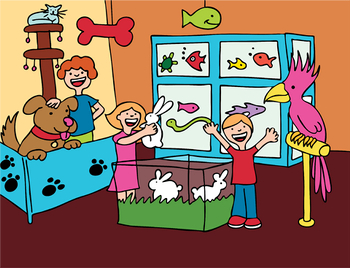
by Robert W. Bly, founder, AquariumDetective.com

You probably have a number of stores in your area selling tropical fish and aquarium supplies. Which should get your business?
Proximity is a key factor. The store must be within 20 minutes driving distance, because fish can only survive comfortably in plastic bags for 20 to 30 minutes or so.
Do you have fish, lizards, or other pets that require live food? Look for a fish store that�s nearby. Otherwise, the weekly trip to replenish live food supplies can eat up a lot of your time.
You have 4 choices when it comes to shopping for fish, fish food, and aquarium supplies:
- Department stores.
- General pet stores.
- Chain pet stores.
- Privately owned pet stores.
- I have identified 3-4 fish stores in my area with a variety and quality of fish and supplies good enough that I am comfortable buying from them.
- Of these, one is a large nearby owner-operated fish store with the largest selection of unusual and novelty fish, and the most knowledgeable staff.
- I go weekly to this owner-operated store to buy live black worms and shrimps, and when there, to pick up any other supplies I need as well as check out what's new. Since I have a 92-gallon tank with room to spare, if I see something I like, I buy it.
- I periodically visit the other stores to check out their stock. If they have something I want and the fish look good, I might pick it up there and save some money.
- I do give the large owner-operated store in my area most of my business, and make it a point to talk with and get to know the staff. They appreciate the steady business, and as a regular customer, I get great treatment and attention.
- This big store is a 10-minute drive from my house. There is another even bigger, even nicer owner-operated fish store in an adjacent county. But this one is almost a half hour from our house. So we reserve trips there for special occasions, when we have the time and feel in the mood for leisurely browsing.
- This even bigger store is our back-up for when our primary fish store is out of something we want.
- For instance, when we went to our primary store to buy a teacup stingray, they were out of stock that day. Since we were eager to get it, we drove to the adjacent county and bought the teacup from them - a specimen in excellent health sold at a competitive price.
Although it's less common today, some large department stores have pet departments. These are usually poor choices for the dedicated hobbyist. Their selections are small, the specimens often in poor health, and the staff lacking knowledge of what they are selling.
General pet stores sell all kinds of pets: not just fish but birds, hamsters, kittens, ferrets, and puppies.
What pets does the store focus on? If it's puppies and kittens, you're probably better off going elsewhere.
On the other hand, some fish stores branch out into other pets, but obviously remain focused on fish and fish keeping. These stores can be a good place to buy.
The giant chain pet stores are discount-oriented, so they can potentially save you money.
That savings can be quickly offset by bad advice or sick fish.
At one chain, we bought a saltwater fish that turned out to be ill. The disease quickly spread and that $25 "bargain" fish cost me $300 to replace the other fish in my tank that got sick and died.
The staff at chain pet stores can be knowledgeable, although they rarely match the experience and in-depth knowledge of private pet stores.
In addition, the selections at chain pet stores are usually restricted to standard fish: barbs, tetras, neons, swordtails, gourami, catfish, and small cichlids.
I prefer to give my trade to non-chain local pet stores run by an owner who is also a dedicated hobbyist.
Although there prices may be a bit higher, the selection is larger, and the specimens are usually well-cared-for and healthy.
Pet stores run by an owner/hobbyist are most likely to stock interesting, unusual, and novelty fish you won't find in the pet store chains; e.g., arawana, blind cave fish, blue lobster, freshwater shrimp, red crabs, loaches.
The owners usually hire store clerks who are also hobbyists. Therefore, the knowledge of the salespeople in these stores is extremely high.
They can reliably tell you what fish can and can't get along with the fish already in your tank. They can guide you more accurately if you bring your completed fish log with you when buying new fish.
A good practice when bagging fish for sale is to shoot compressed oxygen or air into the bag to oxygenate the water so the fish can last longer during transport. Owner-operated fish stores always do this, but chains, pet stores, and department stores may not.
Here's how I divide my business among the fish stores in my area:
To sum up, here's what I look for in a fish store:
- Location.
- Owner-operated.
- Knowledgeable staff.
- Well-kept, healthy specimens.
- Gets new fish in weekly.
- Good selection with nice variety.
- Stocks unusual and novelty specimens.
- Good brands of flake and pellet food in many sizes.
- Daily availability of live food.
- Sells fish in oxygenated water.
- Double-bags to prevent leakage.
- Wide selection of tanks, decorations, and other supplies.